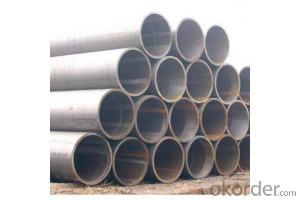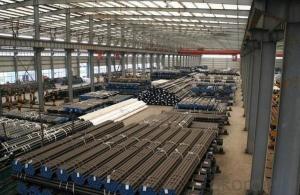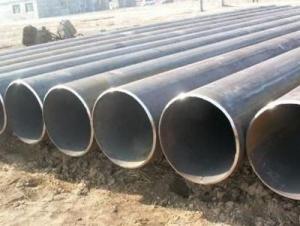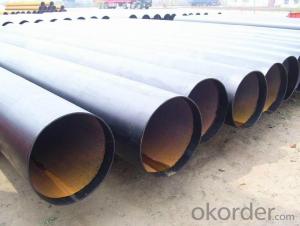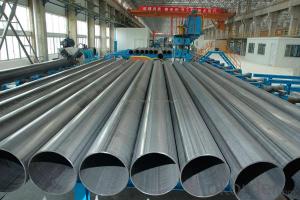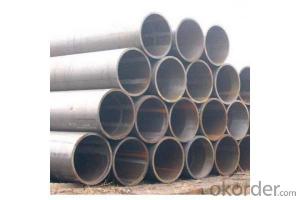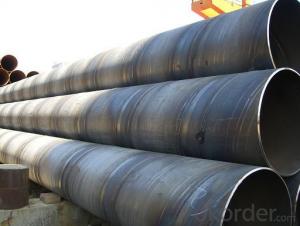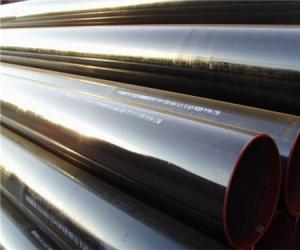LSAW SSAW CARBON STEEL PIPE ASTM API PSL1 PIPE LINE
- Loading Port:
- Tianjin
- Payment Terms:
- TT OR LC
- Min Order Qty:
- 1 m.t.
- Supply Capability:
- 3000 m.t./month
OKorder Service Pledge
OKorder Financial Service
You Might Also Like
Packaging & Delivery
Packaging Detail: | Normal exporting packing,in container or bulk vessel or as per clients' request |
Delivery Detail: | 2 months after confimed contract |
Specifications
Large Diameter API 5L X70 PSL2 LSAW Steel Pipe
Grade: X42, X46, X50, X52, X60, B, C
OD: 1.5"-28"
WT: SCH10-SCH160
Large Diameter API 5L X70 PSL2 LSAW Steel Pipe
Specifications:
u Standard: API 5L
u Grade: B, C, X42, X46, X50, X52, X56, X60, X65, X70, X80
u OD: 1.5"-28"
u WT: SCH10-SCH160
u Length: 5-12m
u Ends Finish: plain end, bevel end, grooved end
u Surface Treatment: bare, black varnished, oiled finish, red color, anti-corrosion, 3PE, FBE or epoxy coating
u Technique: hot rolled or cold drawn
u Application: api 5l steel pipe for conveying oil, water, gas
u Invoicing: based on theoretical weight or actual weight
u Payment Terms: L/C at sight, T/T or Western Union
u Trade Terms: FOB, CFR, CIF
u Certification: ABS manufacturing assessment, ABS design assessment, API 5CT, API 5L, DNV manufacturer certificate, ISO9001 quality management system certificate, ISO14001 environment management system certificate, GB/T28001 occupational health and safety management system certificate, A1 class manufacturing license of special equipment certificate, CCS, GL, LR, SGS, TüV, PDE
- Q: What are the different types of supports used for steel pipes in buildings?
- Some common types of supports used for steel pipes in buildings include pipe hangers, clamps, brackets, and roller supports. These supports are designed to provide stability, prevent sagging or bending, and distribute the weight of the pipes evenly. The choice of support depends on factors such as pipe size, location, and load requirements.
- Q: What is the role of steel pipes in the construction of stadiums?
- Steel pipes play a crucial role in the construction of stadiums as they are used for various purposes including structural support, drainage systems, and the installation of utilities such as water, gas, and electrical lines. These pipes provide the necessary strength and durability to support the weight of the stadium's roof, seating areas, and other infrastructure. Additionally, steel pipes enable efficient transportation of liquids and gases, ensuring proper functioning of the stadium's facilities.
- Q: What are the non-destructive testing methods used for steel pipes?
- Some of the non-destructive testing methods used for steel pipes include ultrasonic testing, magnetic particle testing, eddy current testing, radiographic testing, and visual inspection.
- Q: Can steel pipes be used for geothermal heating systems?
- Yes, steel pipes can be used for geothermal heating systems. Steel pipes are commonly used for their durability and ability to withstand high temperatures and pressures. They are suitable for transferring geothermal heat from the ground to the heating system within a building. However, it is important to consider the specific requirements of the geothermal system and consult with professionals to ensure proper installation and compatibility with the system components.
- Q: What are the different types of steel pipe caps?
- There are several different types of steel pipe caps, including threaded caps, socket weld caps, butt weld caps, and flanged caps.
- Q: Can steel pipes be used for oil wells?
- Yes, steel pipes can be used for oil wells. Steel pipes are highly durable and resistant to corrosion, making them suitable for the harsh conditions and high-pressure environments encountered in oil drilling operations.
- Q: Are steel pipes suitable for use in acidic environments?
- Yes, steel pipes are generally suitable for use in acidic environments. However, the specific grade of steel and the concentration of the acid should be considered to ensure proper corrosion resistance. Coating or lining the pipes with materials such as epoxy or rubber can also enhance their resistance to acidic conditions.
- Q: What is a flange and how is it used in steel pipes?
- A flange is a flat, circular fitting that is attached to the end of a steel pipe. It is used to connect two pipes or fittings together, allowing for easy assembly and disassembly of the pipeline system. The flange provides a secure and leak-proof connection by bolting the flange to the adjacent flanges or equipment. It also allows for the attachment of valves, pumps, or other components to the pipeline. Overall, flanges play a crucial role in ensuring the integrity and functionality of steel pipes in various industrial applications.
- Q: How are steel pipes used in the manufacturing of hydraulic systems?
- Steel pipes are commonly used in the manufacturing of hydraulic systems due to their durability, strength, and resistance to high pressure. These pipes are used to transport hydraulic fluids, such as oil or water, throughout the system, ensuring the smooth operation of various components, such as pumps, valves, and cylinders. The steel pipes provide a reliable and leak-free connection between these components, allowing for efficient transfer of power and control in hydraulic systems.
- Q: How are steel pipes made?
- Steel pipes are made through a process called pipe manufacturing, which involves multiple steps. Firstly, raw steel is melted in a furnace and then subjected to continuous casting to form a solid billet. This billet is then heated and pierced to create a hollow tube called a shell. Next, the shell is rolled and stretched to the desired diameter and thickness using a series of rollers. The pipe is then subjected to a process called welding, where two edges of the shell are fused together to create a seamless or welded pipe. Finally, the pipe undergoes various finishing processes such as cutting, straightening, and inspection before being ready for use.
Send your message to us
LSAW SSAW CARBON STEEL PIPE ASTM API PSL1 PIPE LINE
- Loading Port:
- Tianjin
- Payment Terms:
- TT OR LC
- Min Order Qty:
- 1 m.t.
- Supply Capability:
- 3000 m.t./month
OKorder Service Pledge
OKorder Financial Service
Similar products
Hot products
Hot Searches
Related keywords
